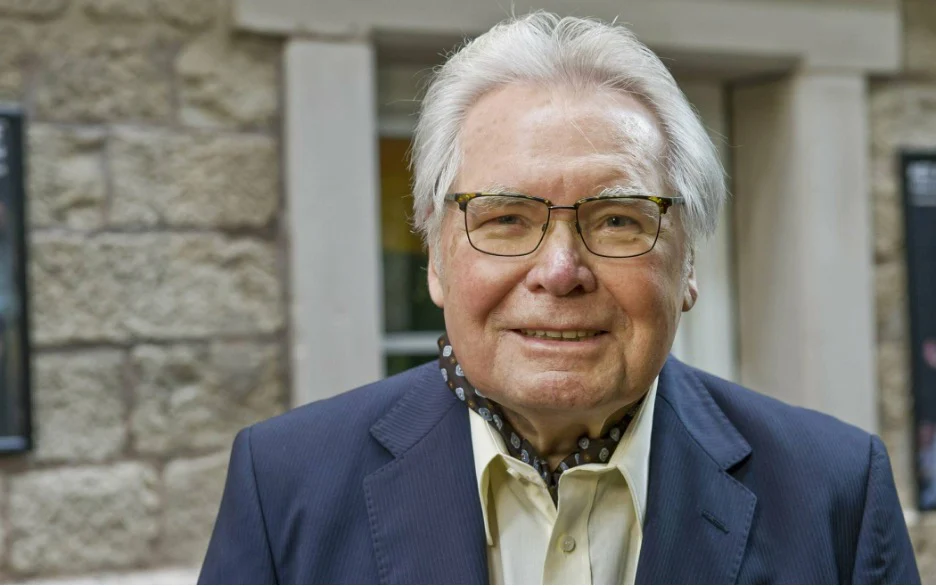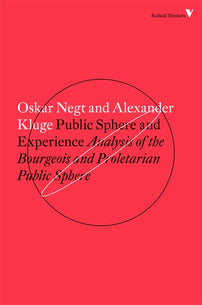Oskar Negt (1934-2024)
A social philosopher of enormous influence in the Federal Republic of Germany, Oskar Negt is best known in the Anglophone world for his collaborative theory penned together with author and filmmaker Alexander Kluge. A giant in his own right, the riches of Negt’s considerable body of theory have yet to find their audience beyond German-speaking Europe.

Oskar Negt, one of the Federal Republic of Germany’s most influential social theoreticians, passed away on Friday, February 2, 2024, in Hanover, Germany. He was 89. Negt died after a long and difficult battle with Parkinson’s disease.
Aside from his five collaborations with Kluge—Public Sphere and Experience (1972; trans. 1993), History and Obstinacy (1981; trans. 2014), Measured Relations of the Political (1992), Search Terms (2001) and Kant Commentaries (2023)—Negt was incredibly prolific. Since his training at the Institute for Social Research in the second half of the 1950s under the direction of Max Horkheimer and then Theodor W. Adorno, he published nearly thirty monographs, some twelve essay collections, and hundreds of articles and interviews. A considerable portion of this most ambitious work appeared after his retirement as professor of sociology at the University of Hanover in 2002. Often counted as a member of the Frankfurt School’s second generation, Negt’s writings intentionally avoided musing on the first generation’s history, merits, and lacunae and instead sought to apply its principles to areas otherwise overlooked by his teachers. One triumvirate of themes his work tackled is the importance of education, the dignity of labor, and the need for political theory. Another attendant triad is solidarity, democracy, and utopia. Two core principles subtending all of Negt’s work are theory and praxis. In Negt’s hands, theory was never to be reduced to the status of a procedural outline for emancipatory praxis. Always grasped dialectically, theory was for him aways a matter of orientation.
A life-long member of the Social Democratic Party of Germany like his father before him, Negt was active in the Socialist German Students’ Union, the SPD’s collegiate branch, already during his training as a lawyer at the University of Göttingen. Inspired by a copy of Horkheimer and Adorno’s Dialectic of Enlightenment he found at a local library before attending college, Negt left law school and moved to Frankfurt in 1955 to devote himself to philosophy. What entranced him was Horkheimer’s emphasis on praxis. Eventually, it was Adorno’s way of thinking that won him over. (Negt once remarked that Adorno worked on concepts with the precision of a watchmaker.) With Adorno’s support, Negt transformed his master’s thesis in sociology, initially entitled On the Structural Relationships between Comte’s and Hegel’s Social Doctrines, into a dissertation literally overnight. It was, however, Jürgen Habermas who then employed Negt as his assistant and under whose influence Negt flourished, albeit not without conflict. As the West German student movement heated up, Negt’s tutorials at the University of Frankfurt became the stuff of legend; his class on Marx’s Paris Manuscripts offered, for example, in the winter semester of 1968-1969 attracted some 700-800 students.
Negt’s was singular among Frankfurt School intellectuals on account of his close contacts with student movement leaders. He mentored the brilliant Hans-Jürgen Krahl. He debated with Rudi Dutschke the conditions for effective political work. (Years later he coached Joschka Fischer.) His speeches on the occasion of Benno Ohnesorg’s assassination, the German Emergency Acts, the leftist fascism debate and Angela Davis’s incarceration were seminal moments in the history of West Germany’s extra-parliamentary opposition. As that movement devolved into more radical and violent forms of politics, Negt grew more distant, for violence—a concept of sustained reflection for Negt—poses a direct threat to the constitution and maintenance of commonwealth. Unsurprisingly, Red Army Faction-member Horst Mahler eventually considered Negt their enemy. Ulrike Meinhof labeled him a “pig.” Negt would continue his support for the New Left beginning in the early 1970s with his involvement in the Socialist Office, a grassroots democratic effort dedicated to organizing West Germany’s undogmatic socialist organizations, and the Glocksee Schule, an alternative primary and secondary school based in Hanover. Negt’s support for unions and social democrats—values dating back to his youth in East Prussia—remained steadfast throughout his life.
“Somehow I managed to fall between the cracks between the disciplines,” Negt once confessed in an interview. Indeed, Negt’s thought has embodied the very interdisciplinarity that Horkheimer outlined for Critical Theory in the early 1930s. His first and most successful book, Sociological Fantasy and Exemplary Learning (1968), takes recourse to C. Wright Mills’ concept of “sociological imagination” and German science pedagogue Martin Wagenschein’s theory of “exemplary teaching,” to address the alienation of among unionized workers. His Modernization under the Sign of the Dragon (1988) is one part travelogue and another part philosophical encounter with Chinese thought and the Eurocentrism of modernity. Savaged by literary scholars, his The Faustian Career: From Hopeless Intellectual to Failed Entrepreneur (2006) creatively re-reads Goethe’s Faust II as a premonition of the neoliberal subject. Arguably the culmination of Negt’s career is his late trilogy on learning, labor, and politics. In the first volume, Childhood and School in a World of Upheaval (1997), he queries the potential for reinvigorating enlightenment principles in school reform. An exhaustive reworking of his 1984 monograph Living Labor, Expropriated Time, the second volume, Labor and Human Dignity (2001), outlines what Negt calls the “erosion crises” of late modernity and their impact on the neo-liberal organization of labor, politics, and social responsibility. The third installment, Political Man: Democracy as Form of Life (2010), circles back to what Negt long knew was lacking in Marx’s thought, namely a theory of politics. What, he asks at the outset of that book, determines existential political decision making in an age of globalization? In his two-volume autobiography, Negt weaves the story of his family’s harrowing flight from the East Prussian homestead of Kapkeim with philosophical insights gleaned in large part from Immanuel Kant but also Marx and his Frankfurt teachers. Most recently, Negt published with the assistance of Hendrik Wallat transcriptions of three volumes of his university lectures that form the outlines for a history of the “political philosophy of solidarity.”
Deeply suspicious of philosophical trends, Negt’s thinking repeatedly oriented itself according to him the alpha and omega of modern German thought: Kant and Marx. Polar opposites in terms of their respective investments in genesis and validity, Kant and Marx were for him models for thinking how critique and self-critique can be harnessed for the constitution of peace. “We don’t think much of the Leftist habit of dropping a theory if it does not immediately provide an explanation for newly emerging phenomena,” he explained in an interview with Kluge from 1982. “The dizzying speed with which theories and bits of theories are subject to change—which has further accelerated because of the example set by the French—is not of interest to us. Instead, we collect together the issues that others have cast aside, and we try to pursue them: to progress beyond the big picture until we arrive at the cellular forms.” That is not to say, of course, that Negt’s thinking precluded thinkers other than Kant and Marx. Ernst Bloch and Alfred Sohn-Rethel were as important Marxist influences as were Vladimir Lenin, Georg Lukács, and Karl Korsch, just to name a few. He was as well-versed in ancient Greek thought as he was in recent postmodern trends in sociology. He knew his political theory, especially Carl Schmitt’s and Hannah Arendt’s, and, of course, the works of his mentors and peers from the Frankfurt School. Surprising to some, he also knew his way through the canon of modern German literature like the back of his hand.
To be sure, there is still much to be discovered in the exceptional, six-decade collaboration between Negt’s social philosophy and Kluge’s aesthetic practice. Reflecting on their working relationship, Kluge, two years Negt’s senior, recently explained that Negt was always the theoretically savvier of the two. For that reason, Negt always counted as Kluge’s “older brother” in their intellectual exchanges. “The hierarchy was always clear,” he explained. Negt always had the final say.
[book-strip index="1"]
